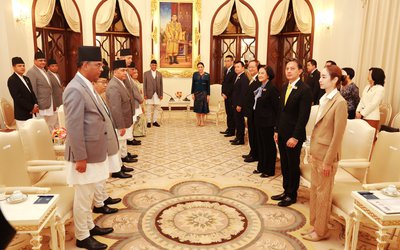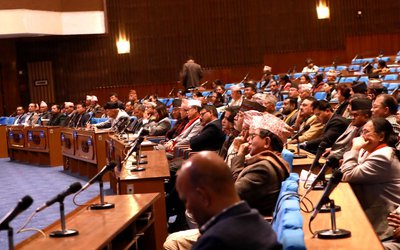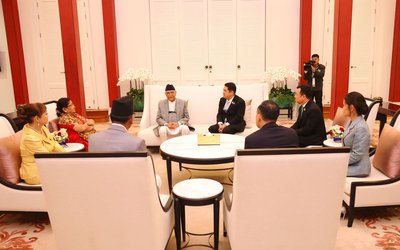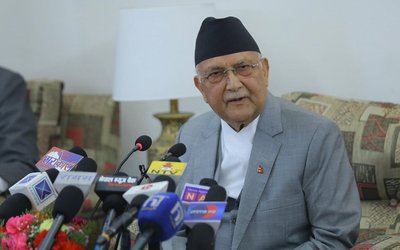More on News





Baburam Bhattarai's election as the Prime Minister was seen and projected as the last bet for peace and constitution making process to conclude. The international community, especially India and the United States, were more convinced than others that Bhattarai was the most competent among the leaders in the country, and that the twin objectives of the post-2006 politics would be achieved under him. But Bhattarai has proved to be the biggest flop, and perhaps the weakest Prime Minister the country has seen in the recent past. However, Bhattarai is not to blame solely for this.
Defense Minister Sharat Singh Bhandari refused to quit, despite the Prime Minister’s insistence that he do so, following Bhandari's statement that no law could prevent the secession of the country if 22 districts along the plains bordering India ever so decided. Bhandari has neither retracted the statement, nor apologised for it. His party leadership has firmly stood by Bhandari. Prime Minister Bhattarai is too weak to take action against Bhandari as for him sticking to the chair appears more important than acting. Action against Bhandari will risk the chair. Coalition of conflicting interests, no doubt, will make a Prime Minister prone to blackmail if he has the lust for power upper-most in mind. Bhattarai has proved he is no different from his predecessors.
Matrika Yadav, as a cabinet rank minister from the Maoist party, yelled at then Prime Minister G P Koirala that he was the 'bhrasta sardar' (chief of the corrupts) in the cabinet soon after the Maoists joined the government in 2007, and could get away with it. Koirala did not take any action against Matrika as that would have possibly triggered a Maoist walk-out from the government, leaving the peace and constitution making process shaky. It was G P Koirala who also presided over the authority of the Prime Minister. Each coalition constituent after 2006 April has nominated its leader in the cabinet, and each Minister would be more answerable to the leader of the party he or she belonged to than the Prime Minister. Each minister since then has acted freely and used or misused the fund of the ministry concerned without any transparency or accountability. Normslessness and corruption have been the essential ingredients of the Nepali politics with absolutely no accountability during the past five years of change. Politics and political leaders--with few exceptions--were never so discredited and corrupt ever before in Nepal. But leaders, especially the Maoists, continue to orchestrate like the Goebbels that the country is poised for political stability, economic progress and permanent peace.
Prime Minister Bhattarai obviously will have no courage to act against Bhandari. By not acting, he is also giving a message that so long as he can continue in the post, he will tolerate any kind of conduct and speeches by any minister even if that means promoting politics that advocates secession. Opinion polls clearly indicate that people have realised that the post 2006 political actors have tried to fragment the country and create a social setup divided by mismanaged politics of identity at the cost of Nepali nationalism. A recent nationwide poll conducted by Inter-disciplinary analysts has shown that nearly 70 per cent of the people want to be identified as a 'Nepali' and not by their ethnic origin or territorial base. Neither Bhattarai, nor Bhandari seems to have realised this.
And a weak Prime Minister goes to Delhi, Nepal's important neighbor, with no clarity on the agenda he will be taking up. How will a country that exerts so much influence in Nepal's internal affairs treat him? His own party, the Unified Communist Party of Nepal-Maoists (UCPN-M), has asked him not to enter into any treaty agreement with India, and not even discuss controversial issues during the four day visit. India has been wanting to offer any help to accomplish the peace and constitution making process, but what will that mean without clarity and consensus in Nepal. Political parties that India supported and trusted have miserably failed the Nepalese people. The radical course that the India-mediated 12-point initiative had charted out has failed too.
Bhattarai was the last experiment in pursuit of that course and the destination, and with the deadline of 45 days that Bhattarai himself had set, a new search and review of the euphoria driven follies post-2006 movement should begin earnestly.
All actors at home and friends of Nepal abroad must realise that Maoists launched the rebellion against the state and the parliamentary democracy when the 1990 constitution was just five years old. This interim arrangement that has completed five years, cannot and should not continue indefinitely when five Prime Ministers in as many years have only proved that neither Nepali 's unity ,nationalism, nor democracy and political stability are safe in their hands.






